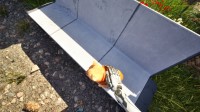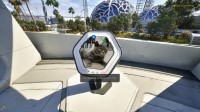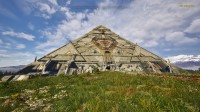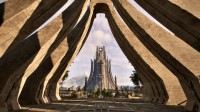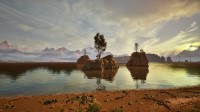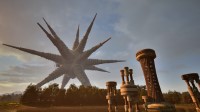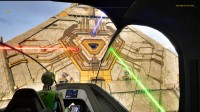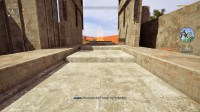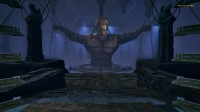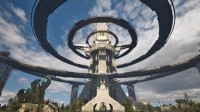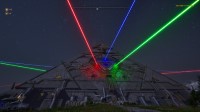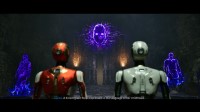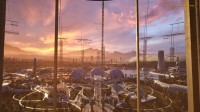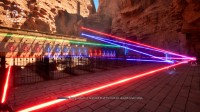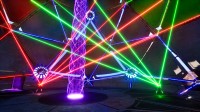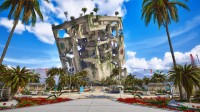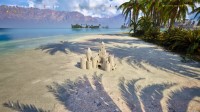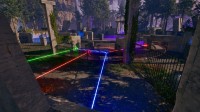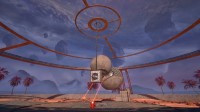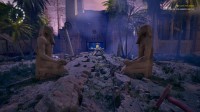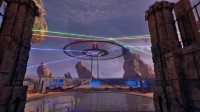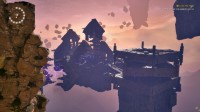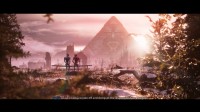The Talos Principle II
Favorite game of 2023! :D
Total Steam Playtime: 50.1 Hours
Base Game IGT: 27.5 Hours, finished 09 March 2024.
Orpheus Ascending IGT: 3.1 Hours, finished 12 April 2025.
Isle of the Blessed IGT: 7.2 Hours, finished 13 April 2025.
Into the Abyss IGT: 5.9 Hours, finished 26 April 2025.
I did one full playthrough doing as much as I could without looking anything up. I did all of the normal puzzles, got all of the stars, finished the golden puzzles for Miranda, and pretty thoroughly scoured all the maps for text logs, audio logs, and the lost labs. I think there's one more achievement for an alternative solution to Switcheroo that I didn't do, but the rest of the stuff I didn't do is for alternative conversations & story beats that require additional playthroughs. I'm not sure if I'm interested enough in replaying the game for so minor a difference (since all the puzzles are the same) so those will remain ungot for now. I supported Byron's ideals throughout the entire game, and I'm quite happy with that decision.
I bought the DLC on release, but took a very long time to actually finish it. I went through the main puzzles of Orpheus Ascending in mid-2024, but got stalled on the extra puzzles and didn't end up getting back to it until April 2025. Isle of the Blessed was very fun and quite easy, so it only took a couple of days to clean it up despite the massive amount of things to do. Finally, Into the Abyss was incredibly difficult and mind-bending for me, so I had to play it over several sessions. In general, I didn't look up any puzzle solutions, but I did reference some tips for several of the ItA puzzles - only a couple of them were super helpful so for the most part I think it's fair to say I did almost all of the expansion blind.
This was an absolutely amazing sequel which managed to surpass my expectations in most ways, given how well put together the first game was. Where the first game was phenomenal in its own right, I felt that the environment was mostly a product of leftover or reused Serious Sam 3 assets, and so the atmosphere of the game never quite managed to capture me - it kind of felt like there was always going to be a random Kleer around the corner. The world of Talos 1 was for the most part very simple and mechanical, but lacking in fidelity or a distinctive aesthetic. Even in that form, though, I felt that the quality and difficulty of the puzzles, backed by a great narrative with an effective twist, cemented it as my favorite puzzle game of all time prior to this release. Talos 2 makes up for all the shortcomings of Talos 1 and more: each of the areas is stunningly beautiful and full of incredible structures and impossible architecture, new puzzle mechanics are very interesting and unique without being too annoying or obtuse, and the story of this game is a fantastic continuation of the world after the final revelation of the original game.
I really like the way the story in this game is presented as a continuation of Talos 1's ending. I didn't want to have just a simple repeat of the desolate, silent worlds of the first game - while I liked the ominous nature of the first, I think it would have made this game feel too similar. Instead, this game focuses on the genesis of a new "human" civilization that carries on the legacy of humanity, harnessing new technology while keeping the mistakes of the past in mind. This is where the main conflict steps in; some citizens of this new society wish to explore and expand, breaching new horizons with the intention to improve life and the world. Their opponents view this as an overstepping of the bounds of humanity, preferring to place limits on expansion and development - as they see this incessant cycle of growth and consumption as a major vice of humanity, causing the wars and environmental collapse that eventually led to the complete downfall of the species. I really appreciate the way these mentalities was actually presented in the game, entirely as a conflict of ideals without devolving into sequences of ad hominem attacks between opponents. The two key voices of the game, Byron and Alcatraz, are completely opposed to one another ideologically, yet they maintain a close friendship and immense respect for each others' opinions. The main plot of this game essentially revolves around the exploration of a newly-found island with incredibly advanced technology, but it's ultimately fairly simple and straightforward, to be used mostly as a medium to spark discussion and debate between the two polarities of the above argument. I did like almost all of the characters though, and some of the personalities in New Jerusalem are pretty entertaining.
Despite the apocalyptic history of this new world, I feel like the tone of this game is incredibly optimistic in the best of ways. The new series of text and audio logs does a pretty good job of cementing this tone - there is a lingering sadness from the consideration that Trevor and Alex are long gone from this world, but an enduring hope in the realization that the efforts of NOEMA were not in vain, and that intelligent life on the world could once again flourish. The way the conflicts are represented in this game - respectfully and earnestly, with a true desire to find the best way forward from all parties drowning out the rare cynic - feels like an advancement beyond the humanity that we seen in the real world today, presenting a society that we should aspire to be. One of the audio logs late in the game really stuck with me, wherein it mentioned how true mental strength lies in the optimism for a better world in the face of hardship (or in their case, death), and that cynicism is a coward's tool to reject our responsibility to improve, and to neglect the potential progress we could make if we simply applied the effort to do so. It is true that the philosophical commentary in this game is quite heavy-handed, even more so than in the first, but I think the way it was written really connected with me.
So obviously this is a puzzle game, which is really the lifeblood of the game at the end of the day. To be fair, the existence of the puzzle trials in the real world doesn't actually make that much sense but I don't think it matters much; they did give a bit of explanation how every new unit had to do a few basic tests during calibration, so with context from the ending it makes sense why Athena would have designed these kinds of puzzles. Many of the mechanics from TTP1 are present here with the exception of the explosive drones and the recorder, and a huge array of new puzzle mechanics were introduced - including RGB converters, inverters, accumulators, drillers, item swapping, teleporters, and more. Most of the worlds tend to introduce one new key mechanic, and each world has 8 puzzles of increasing difficulty utilizing the new element in combination with some older ones. They also each have 2 "lost" puzzles which tend to be significantly more difficult than the other puzzles, as well as 2 star puzzles which are broken down into 3 types: Pandora, who usually requires a laser to activate her box, Prometheus, who requires you to find a floating sprite somewhere in the region and follow it back to the statue, and the Sphinx, who offers cryptic puzzles often involving buttons or switches hidden around the map. The main goal in every area is to complete at least 8 of the 10 main puzzles, unlocking a tetromino bridge minigame where you build a route to the central tower of that area, which in turn activates a laser powering the doors of the island's central megastructure. Near the end of the game, you also unlock a series of 12 extra "Golden Door" puzzles if you completed every other regular puzzle in the game - one for each of the 12 areas.
I loved the puzzle gameplay, but it's reasonable to say that the implementation might not be perfect from everyone's point of view. Anecdotally, I can say that I felt TTP2 was a decent bit easier than TTP1, and I'm hoping that some kind of expansion will be available eventually to add more life to the new world and to provide a greater challenge, in the way that Road to Gehenna was for the original Talos 1. One of the other key disappointments was how a lot of the puzzle mechanics are rarely seen outside of the world in which they're introduced. After the first 3 regions, the remaining areas are more or less unlocked in groups of 3 (for each respective face of the central megastructure - as each requires 3 RGB lasers) so you don't see many puzzles actually combining new mechanics. Even the final areas & golden door puzzles were mostly relegated to simple but challenging laser configurations. At some point, the very well-defined structure of each region can begin to feel a bit stale - you know there's going to be exactly 8 puzzles and 2 lost puzzles, and you know pretty much what the star puzzles are as soon as you see the statue. There aren't many really out-of-the way easter eggs or challenges that you can really do outside of that, except maybe an ancient artifact scavenger hunt. I had a phenomenal time despite this and I personally don't think the game was impacted in any particularly negative way from this decision, but I can definitely understand why some people would feel less than enthusiastic about the streamlining.
The production quality of this game is absolutely stunning, as I implied in an earlier comment. Each of the 12 worlds feels very visually distinct for the most part, representing interesting new biomes and different architecture styles for the buildings and puzzles. As far as both aesthetics and pure graphical fidelity go, this game is absolutely top notch, easily the best-looking puzzle game I've played. I really like the inclusion of some actual wildlife in this game as well, it's really nice to see some birds or deer roaming about while you're exploring the region and solving puzzles - the game overall has a very calm vibe. This is amplified by the terrific soundtrack, once again handled by Damjan Mravunac (with a few additional contributors), who has yet to produce anything less than fantastic work in any of the games he's worked on. There's not much else that needs to be said here; this is the first Croteam game that actually manages to feel entirely at or above AAA-quality in this aspect. Combined with the great characters, thoughtful philosophical themes, and amazing puzzles, in my opinion this is extremely close to being a perfect game. This might be one of the finest game sequels ever, it's one of the best games I've ever preordered, on par with 13 Sentinels, and it's my favorite game released in 2023 with absolutely no competition. In time, I think this will settle into my top 10 or top 5 games I've ever played.
Road to Elysium
The expansion to Talos 2 actually contains 3 separate packages, each of which feels very well fleshed out in its own right. I'm very pleasantly surprised that it was not separated into 3 smaller DLCs, given how much there actually is to do in them. In short, all three parts of the expansion are fantastic - just like Road to Gehenna from Talos 1, I feel like this is another gold standard for DLC in games. I like how the difficulty of each part is tuned to range from a relaxed to an intense experience, with lots of fun and creative puzzles, and the visual theming is both beautiful and diverse, so the world never starts to feel dull - even when getting stuck on some of the puzzles.
Orpheus Ascending is the one I played first, which is meant to be the "Medium" difficulty episode of the expansion. This one focuses primarily on laser mechanics, which I particularly enjoyed since I personally believe that Talos puzzles are at their best with very challenging applications of very simple concepts. Playing through the levels taught me a lot about some of the advanced properties of lasers that I never fully realized or took advantage of in the main game - such as the relative "power" of a source vs. subsequent split connections, or the "capacitance" of lasers preventing immediate dissolution when lasers collide. The knowledge gained from this episode ended up being absolutely crucial for Into the Abyss later on, which really pushes those mechanics to their logical limits. Something to note about this expansion though, which carries into the other two parts (especially ItA), is that solutions make extremely heavy use of "laser chopping", utilizing temporary or permanent collisions to open new pathways. After recovering Sarabhai by completing the main puzzles, there are 3 extra challenges that are truly insane - I found these to be at or even beyond the level of many of the ItA puzzles.
After Orpheus Ascending is Isle of the Blessed, which is the "Easy" difficulty episode. Mechanically, this was basically a regular world in the main game - none of the puzzles were particularly difficult (aside from the Golden puzzles, maybe) and they utilized a pretty good mix of the mechanics introduced throughout the main game without any particular focus. The massive tetrahedron puzzle that makes up the final "tower climb" of this episode was very grand, though I have to say the fact that the gravity of the entire area is tilted gave me some serious vertigo - part of me was hoping it would be over quickly. Aside from the puzzles themselves, IotB acts as a pretty entertaining epilogue to the plot of the main game - the backstory is that the zone was built as kind of an amusement park simulating the challenges that 1K went through on Athena's Islands. Lots of characters (including 1K with a voice pack installed!) make a return, and you get to see how things have progressed after Athena's rescue. There's lots of dialogue going over the characters' relationships, the status of the society (including space exploration - as alluded to in the main game), and generally goofy catch-up moments. Turns out robots would like the crunchy texture of coconut husks, who knew? While the philosophical aspects of the game kind of take a backseat here and the writing tends to be a bit sappy, I really enjoyed this glimpse into the future of this world.
Finally, Into the Abyss is the "Difficult/Insane" difficulty episode, and it certainly lives up to that moniker. While IotB had lots of little side-distractions in the Lost puzzles, stars, and other things you can gather, IoA is primarily a simple collection of 24 puzzles (none hidden), each of which is extremely hard - far beyond anything in the other two and in the base game, save maybe the challenge puzzles in OA. The premise of this one is to detail Byron's experience when he was stuck in the Megastructure's machine in the main game, forcing him to confront Athena's nightmares and his own. This expansion has a ton of super tough, but very creative puzzles. The majority of them are actually quite small in scale, but require very creative & advanced uses of mechanics that were introduced in OA - specifically laser chopping - in order to model complex behaviors under extremely limited constraints in both time and resources. Solving pretty much any of these is guaranteed to temporarily make you feel like a genius, which is a great feeling for a game like this. There are also some super creative & interesting puzzles - Tidal Lock featured an incredibly cool mechanic, even if it wasn't actually very difficult (relative to the rest of the puzzles here, anyway). Ultimately, I feel like this is probably the best set of puzzles overall - not only are they very satisfyingly difficult, they feature fascinating solutions that aren't too complex or time-consuming to get boring.
From both a value and quality standpoint, Road to Elysium far surpassed my expectations. It enhances the already fantastic content offering of Talos 2 - firmly cementing it above the original Talos, and (in my opinion) above any other puzzles game that I've played before. If I had to nitpick one specific thing, it would be that these episodes (particularly OA and ItA) like to use the laser chopping mechanics a little bit too much in the puzzles - but in all fairness, that is one of the absolute hardest mechanics to actually understand and utilize. Overall, it was a nearly perfect experience.


